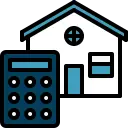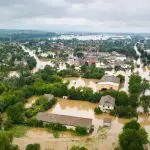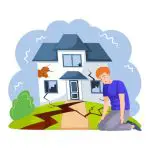When buying homeowners insurance, it is important to keep in mind that there are many perils a basic policy will not cover. The more common examples of such exclusions are earthquakes, floods, and termites. But did you know there are more instances that are considered exclusions? Below we provide a comprehensive list of exclusions to help you decide which gaps to fill.
- Each insurance company has its own list of exclusions that it will not cover in a basic home insurance policy.
- Many homeowners insurance companies will offer endorsements for an additional fee to cover exclusions.
- Each insurance company is different, so you should always check for a comprehensive list of exclusions before signing up for a policy.
Certain dog breeds
Some insurance companies will limit the type of dog you can have listed on your insurance policy. This is because they view these dog breeds as a higher risk to insure than other breeds. Each insurance company usually has its own list of excluded dogs, but some common breeds are:

- Pitbulls
- Rottweilers
- Doberman Pinschers
- Staffordshire
While this is not a comprehensive list of excluded breeds, it is a common example. For a more comprehensive list check our other article. If you have a breed that is excluded, try to find a dog-friendly homeowners insurance policy. Dog bites and incidents can be very expensive for a homeowner without coverage.
Earth movements
There are many insurance policies that will not cover earth movement perils unless an endorsement is added. Ground movement does not just refer to earthquakes either, the following can also be considered:
- Landslides
- Mudslides
- Sinkholes
- Subsidence
- Land shocks or waves
- Mudflow
- Other shifting or sinking of the earth
Essentially, if the earth moves and it affects your home, it will not be covered without an additional endorsement. If you live in an area where landslides, mudslides, earthquakes, or other similar situations occur regularly, you should consider looking into additional coverage.
Flooding
When it comes to water damage, homeowners insurance is very particular in what it will or will not cover. In general, if the water damage is determined to be caused by natural flooding, it will not be covered. It will also not cover sump pumps or sewer backups, or water that seeps up from the ground.
In the event that the water damage is caused by a burst pipe or a broken appliance such as your dishwasher, your insurance company is likely to cover the damage and repair costs since these events are considered covered perils on your policy.
While flooding is not covered by standard homeowners insurance, most insurance providers will allow you to add a separate flood insurance coverage to protect your home and personal property from this peril.
Full cost of high-valued items
If you own items of high value, such as computers, televisions, or other valuables, the basic insurance coverage will not cover the full cost of replacing these items. It often will only cover up to a maximum total amount for all items. For example, the limits may vary from company to company. A typical limit for lost jewelry is $2,500.
It is highly recommended that you either increase the maximum coverage of your current policy or add an additional policy to cover the high-valued personal property items if you wish to cover the cost of your high-value items.

Government action
If your local, state or federal government does any damage to your property, your homeowners insurance will not cover the cost of repairs. This type of damage is typically covered by the government’s liability insurance and is often put in as a claim against the government entity. If this instance happens to you, call your local government agency to determine what the next steps are.
Home-based business liability
If you are a business owner and use your home as your office, your insurance policy will not cover any liability or perils your home faces directly related to the home-based business. This is more evident if you own a daycare or a home massage business. Keep in mind your outside landscaping will not be covered either if a client were to damage the property in that way.
Intentional damage
If you have a family member that gets angry and decides to damage your home, this damage will not be covered by your homeowners insurance. Also, if your family member or yourself purposely causes damage to another individual or their property, your homeowner’s insurance will not cover these circumstances, and you will find yourself paying out of pocket.
Local building ordinance or law
If your local zoning or building laws require you to make modifications to your home to bring it into compliance with current standards, homeowners insurance will not cover these expenses. For example, if your home requires a handicapped access ramp or new sprinkler system, these expenses would fall on the homeowner and not the insurance company. Most insurance companies offer an add-on coverage called ordinance or law insurance to cover this exclusion.
Mold or wet rot
There is another gray area when it comes to homeowners insurance when it comes to mold and damp rot. Insurance companies will only cover this type of damage on the basis of the circumstances relating to mold or damp rot.
It is for this reason that homeowners insurance policies do not provide coverage for mold or wet rot that has been caused by long-term maintenance neglect or a natural flood.
A sudden or unexpected problem that causes mold, on the other hand, can be covered by your insurance company if it is a sudden or unexpected problem that causes mold.
Nuclear hazards
In the event that you live near a nuclear power plant or if there is a nuclear accident close to your area, your homeowners insurance policy will not cover the damage caused by this peril. This exclusion includes radiation, radioactive contamination, and other nuclear events.
Pest infestations
Rats, termites, ants, and other pests are the bane of any homeowner’s existence. They can cause absolute havoc as they tear through and eat parts of your home and vehicles. Unfortunately, pest extermination and damage must be covered by the homeowner. There are very rare circumstances when a pest infestation would be covered, but those are few and far between and determined by your insurance agency.
Power surges caused by your utility company
If you experience a power surge that is due to your utility company’s negligence or maintenance and it fries your equipment, it won’t be covered. Any time that this type of incident happens and it occurs off-property, it will not be covered. If the electrical issue happens inside your home and causes peril, it is typically covered if it is not due to negligence.
War
In the event that a war breaks out, either civil, undeclared, or otherwise, and your home is affected by the war, your insurance policy will not cover the repairs that need to be made to your house.
Wear and tear or neglect
If you notice a leak at home or the need for other routine maintenance and choose to ignore it, it can snowball into a larger issue. If this issue causes your home any damage, your insurance company is not liable to cover the causes. This is because the lack of action on the owner’s part is considered neglect. Houses break down over time naturally, and it is the homeowner’s responsibility to maintain their premises to try to prevent large perils from occurring.
Wind damage in hurricane States
If you live in a state that is often prone to hurricanes, such as Florida, Georgia, Louisiana, Texas, and South Carolina, wind damage, hail, and hurricane damages are not usually covered under basic homeowner insurance policies. Instead, a special endorsement needs to be purchased to cover damage from this type of natural disaster.
Frequently asked questions
What are typical exclusions for homeowners insurance?

Some of the typical exclusions for homeowners insurance are earth movement including earthquakes, flood, wear and tear, war, and neglect. While these are typical, they are not comprehensive. Each homeowners insurance policy provides different stipulations and exclusions. It is important to read the entire document before locking into a plan to ensure you have the coverage you need.
How do I check what my home insurance exclusions are?

Typically, exclusions are listed after the coverage section of your insurance policy. However, some insurance agencies include exclusions within the coverage itself. If you find yourself struggling to find exclusions on your policy, speak with your agent or insurance provider to obtain a comprehensive list.
What add-on coverages or endorsements can I add to cover the excluded perils?

Although insurance companies provide a list of exclusions for your initial policy, they often offer endorsements to cover these exclusions. Endorsements are separate or add-on policies that will cover an excluded peril for a certain fee and deductible. Some of the common add-on and endorsement options are earth movement, flood, sewer backup, service line, and equipment breakdown coverage. Each company offers different add-ons and endorsements, so it is best to ask what options they have before making a final decision.
Read the fine print
When selecting a homeowners policy, it is of the utmost importance to read all the exclusions and also fine print. If you ignore these sections, you may find yourself with an insurance policy that does not cover events relative to your geographical location or home. Ask for a list of exclusions to help you determine whether or not you need to fill the gap with a homeowners endorsement.

